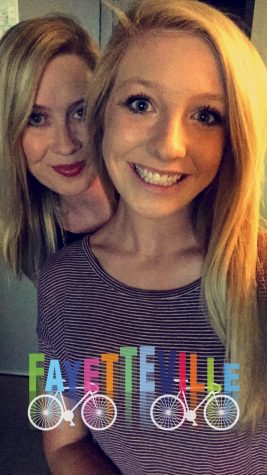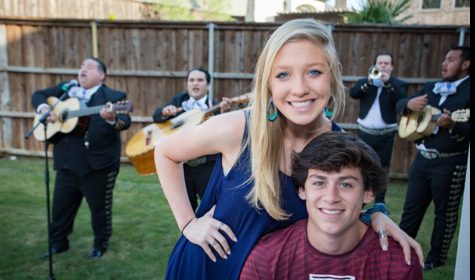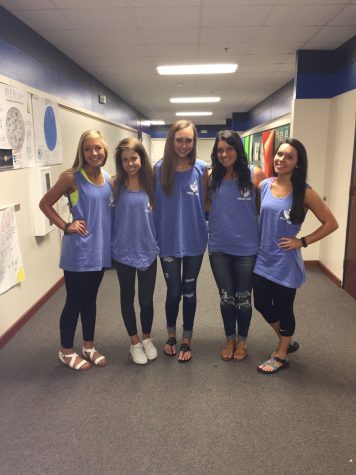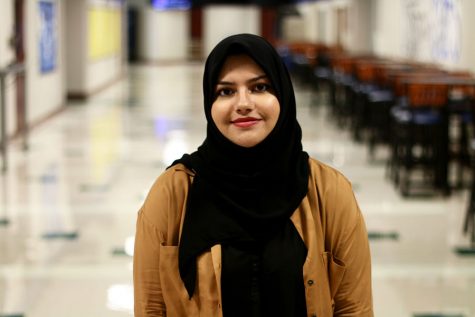Missing Pieces
Senior learns how to cope with amnesia
Senior Avery Crowe sits in her parking spot. Due to her relapse in late August of 2016, Avery lost memory of painting it.
Senior Avery Crowe can’t remember half of what she has seen, learned or been told.
On Feb. 7, 2015 Avery was playing in a soccer showcase in Austin, Texas when, while trying to head the ball, she bumped heads with another player. Despite the incident, she stayed in the game and headed the ball 10 to 15 more times. Once home, her parents took her to the Medical Center of Plano where she had a CT scan. It came back normal and they were told it was a typical concussion; but her parents noticed her memory retention span was only two to five minutes in length. This led to multiple doctor visits and multiples misdiagnoses.
In December of 2015, Avery was diagnosed with two types of amnesia, cognitive damage, vision damage, vestibular damage and a constant headache, all from a concussion during a soccer game over a year ago.
“I was being looked at by multiple colleges so my first thought was I could never play soccer again,” Avery said. “That was really hard for me to get over. [Now] I just kind of pretend it doesn’t happen. I just pretend like everything’s normal for as long as I can, but sometimes it doesn’t work. I don’t want anyone to realize that I’m weak and totally broken on the inside, so I put on a mask and try to stay positive.”
The diagnosis process was not a quick one, as Avery saw countless doctors before getting an answer.

“The hard part was that she was not diagnosed correctly until nine months after her concussion,” Avery’s mother Ashley Crowe said. “It was such a rare thing that no one could really diagnose her and say, ‘yes you have amnesia.’ We kept on going to the doctor and they kept on saying, ‘oh she’ll be fine.’ It was something that I knew and was fighting for a doctor to validate for me.”
Before she was correctly diagnosed, Avery had multiple small relapses where she would forget anywhere from a week’s to a day’s worth of memories. Her biggest relapse wiped all her memories from the day of the concussion up until September of 2015.
“After I had my big relapse, some doctor heard from other doctors what happened to me and they were like, ‘we want to see her, we think we figured it out,’” Avery said. “I went through about 10 hours of sitting in a room [doing] psychological testing just to see if I was faking it or had a mental disorder. The [doctor] did some research and turns out I had these two types of amnesia.”
Along with all the memories she lost, Avery also forgot she had a boyfriend, senior Alex Haas. The couple had started dating in April of 2015, which was wiped out of Avery’s memory.
“On Sept. 15, was when I was with her and she had a feeling she was going to relapse,” Haas said. “That night, I was just hoping that she wouldn’t forget; the only thing I could do was pray. The next day when I texted her in the morning, she responded with, ‘who are you?’ Going to her and her not having a clue of who I [was] and what [we’d] done together, that was really hard, by far the hardest thing I’ve had to overcome in my life.”
Haas has stayed with Avery even after she was diagnosed.
“We’re always there for each other when we need each other and that’s what has kept [the relationship] alive,” Haas said. “[Her condition] has taught me how to be patient, to be respectful of what people have gone through. [She] has matured me because before I knew her, I was always messing around doing bad things, not hanging out with the right people. She’s had a tremendous impact [on me].”

Avery continued to attend school throughout the process of her diagnosis. Once she was diagnosed with both vertical phoria and amnesia, Avery started vision therapy, cranio sacral therapy and vestibular therapy twice every week, which she continues to this day. Her vision improved when she got vision correcting glasses, but Avery is still unable to read.
“I have a ton of accommodations since I can’t read,” Avery said. “Instead of constantly having to look up and down to take notes, I already have the notes printed out for me and they’re in large print. For my [tests] I would have large print and [have] someone read [them] to me.
Avery’s closest friends, seniors Amanda Hassell, Aubrey Dixon, Megan Merrill and Nicole Lowary, have helped her with getting through these last two years of high school.
“When she could [come to school] we would walk her to her classes and eat lunch with her in the nurse’s office because she couldn’t handle the loud noises sometimes,” Hassell said. “[It has] definitely made our relationship stronger, because when you go through adversity it just brings you together more than anything.”

At the beginning of summer, Avery took two medications, one for her constant headache and another for memory. Amantadine, a new medication given to patients with Alzheimer’s and Parkinson’s, turns Avery’s memory on like a light switch.
“Since it was new medicine, it had some side effects, so back in June I was having seizures,” Avery said. “I had to choose between my memory medicine or my pain medicine. I got to a point in my life where I couldn’t deal with the pain anymore, so I chose to stop taking the memory medicine and start taking the pain medicine.”
According to Ashley Crowe, even with all the changes, it’s crucial for Avery’s life to be as normal as possible.
“Going from [being] an amazing, crazy aggressive soccer player to being told you can’t even run, that’s hard,” Ashley Crowe said. “She still does chores, she might take a little more naps, she needs to go to bed earlier, I have to make sure she eats better [and] she can’t stay out as late as she needs to, so that’s a little different, but we try to be as normal as possible.”
Avery plans on going to college, either OU or Arkansas, and continuing to speak to sports teams about the seriousness of concussions. She also hopes to one day write a book about her condition and experiences. Avery currently has a blog where she writes about living with amnesia.
“When you lose your memory, that’s your identity,” Ashley Crowe said. “She’s had to grieve for the loss of soccer, she’s had to grieve for the loss of her memory and those are big things. The heart of Avery is still the same but she’s a lot more mature, very wise, she’s strong. She’s had to grow to survive. She’s the epitome of being thrown this momentous and horrible thing and making something beautiful out of it and I’m so proud of her for that.”

Senior Syeda Rizvi is the entertainment editor and this is her third year on staff. She's obsessed with YouTube and makeup and anything related to those...



